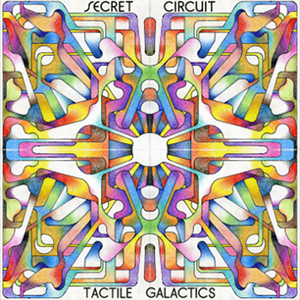Secret Circuit Tactile Galactics
Eddie Ruscha recorded his first project as Secret Circuit in 1995 on a four-track cassette. […]

Eddie Ruscha recorded his first project as Secret Circuit in 1995 on a four-track cassette. Entitled Cosmic Sword #1 (and now up on his Bandcamp), it contained a handful of wonky, lo-fi, electro-acoustic jams where psychedelic guitar riffs circled around bubbling drum-machine beats. In the years since then, Ruscha has overseen a quietly prolific career; he’s self-released a series of cassettes and composed an LP for Emotional Response under his Secret Circuit moniker, and has worked on projects with Rub N Tug‘s Thomas Bullock and disco stalwart DJ Harvey. Tactile Galactics is his first LP for Tim Sweeney‘s Beats in Space label, and it feels like his most polished and approachable record to date.
Two of the tracks, “Afterlife” and “Nebula Sphynx,” were previously released as singles on Beats in Space, but Tactile Galactics is the first full-length release for the fledgling label. The LP displays the solid pop sensibility that Ruscha has cultivated over the past two decades, something that’s particularly strong on “Words in Transit.” The song floats a reverb-heavy vocal hook over a tidy house beat decorated with sparkling piano keys and squelching, chirping instrumentation. Similarly bright and accessible are “Higher Heights” and “Afterlife,” which feature twinkling keys, floating lyrics, and swirling synth melodies. Even the album’s moodier tunes are shiny and orderly; although “Escargot” focuses on a growling low end that drives a headier and more intense trippiness, the arpeggiated melodies still glisten and waggle. “Exalter” follows a similar pattern; despite its menacing edge and dark, dramatic instrumentation, the track still sounds sharp and polished.
Tactile Galactics‘ cleaner, more precise aesthetic makes the album a less experimental and more pop-driven proposition than Ruscha’s early compositions. The playful, explorative energy on his cassettes has matured into a glossier sound, but he still has a penchant for wandering psychedelic solos and abstract noodling. For instance, “Deep Stations” dissolves into a twanging murk, but it’s contained by Ruscha’s tight songwriting and inviting polish. Overall, Tactile Galactics is a confident album, even if it sounds a little safe when compared to the weird tunes Ruscha put out in the past.
Irrespective of this aesthetic, there’s no denying that Tactile Galactics is constructed from a traditional house toolkit. Most tracks, like “Afterlife” or “Parascopic Rope,” roll out airtight beats and squelching acid-house basslines. The music may have a certain sheen, but it’s a product of Ruscha’s experienced hand, not a misstep. The songs on Tactile Galactics may be less sloppy than the ones on those old cassettes, but they’re ultimately just as warm, inviting, and good natured.

